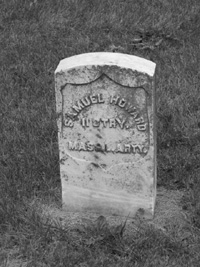 |
Minneapolis Pioneers and Soldiers Memorial Cemetery History Page Alley Article |
| Home | Burial Search | Friends | History | Photo Gallery | Visitor Information |
| Alley Articles |
|
This article originally appeared in the Phillips Alley Newspaper, December 2004.
Civil War Captain Befriended by Mortician Receives a Holiday Orange...a wonderful winter evening story... The story of Captain Samuel J. Howard's death was front page news on December 20, 1908. It was a human interest story—a holiday story about kindness and generosity, and a story about friendship between two strangers. Because of that friendship, Captain Howard, who had no known connection to the city of Minneapolis, came to be buried in Minneapolis Pioneers and Soldiers Cemetery. Captain Howard was a 72 year old Civil War veteran traveling from Olympia, Washington, where he lived in a veterans' home, to Boston for Christmas. During the Civil War, Mr. Howard had served in the Eleventh Independent Battery, Massachusetts Light Artillery. The Tribune's reporter described him as a “grey-bearded warrior,” who was “still proudly wearing the Union blue and prouder still of the little bronze G.A.R. button on his faded lapel.” Harry Hurlburt, a mortician from Minneapolis, boarded the train in Miles City, Montana. He noticed Mr. Howard, huddled in a corner, surrounded by workmen on their way home for the holidays. Mr. Hurlburt persuaded the other passengers to make room so that Captain Howard could stretch out, and he bought him an orange. An orange seems like such a small gift, but in 1908 an orange in December was a luxury that many could not afford. On the day that Mr. Howard died, the Tribune ran an article announcing the arrival of the first boxes of Christmas oranges from Arizona; they retailed from $6 to $7 a box. In comparison, ham cost 11 cents a pound and a 98-pound bag of flour cost $1.90. In 1908, oranges were among the most prized of holiday treats. When the train arrived in Minneapolis, Mr. Hurlburt ordered an ambulance for Mr. Howard and rode in it with him to City Hospital. Mr. Howard was still holding the orange that he had been too weak to eat. After getting him settled in at the hospital, Mr. Hurlburt told Mr. Howard that he and his wife would be back to visit after dinner. By the time that they arrived, Mr. Howard had died. The cause of his death was kidney failure. Mr. Howard had made his own plans about where he wanted to be buried. Among the papers that he was carrying was a deed to a cemetery plot in Turnwater Cemetery in Olympia, Washington. He also had a list of people to be contacted in the event of his death, including the name of a son in Springfield, Massachusetts. For unknown reasons, none of the people on Mr. Howard's list claimed him, so the arrangements for his burial fell to a man whom he'd known for less than a day. Harry Hurlburt was only 27 years old when he met Samuel Howard. He lived for almost forty more years. Harry Hurlburt died on January 13, 1946, and was buried in St. Mary's Cemetery.
Next Article -> John Cheatham -- February 2005 |
|
©Friends of the Cemetery, 2005-2008 Contact us at history@friendsofthecemetery.org |
File last updated: Monday May 23, 2005 |
 Samuel Howard:
Samuel Howard: